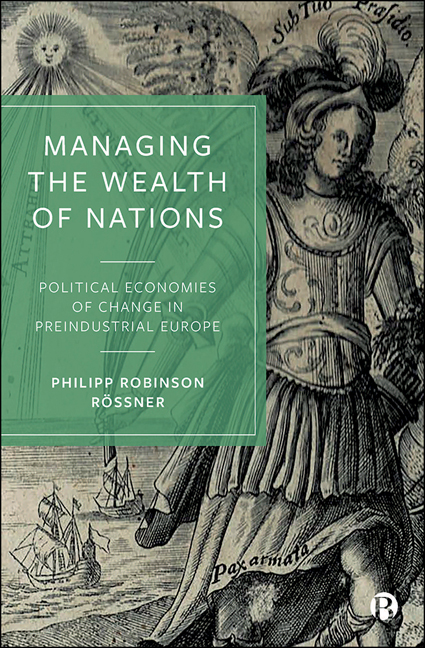Book contents
- Frontmatter
- Contents
- List of Figures and Tables
- Acknowledgements
- 1 Inventing Dynamics: Political Economies of Money, Markets and Manufacturing, 1300s–1800s
- 2 Governing the Future: Capitalism’s Early Modern Temporalities and the Origins of Growth
- 3 The Myth of the Myopic State: Governing Economy and the Politics of Economic Change, 1250s–1850s
- 4 Configuring Free Markets: A Deeper History of Laissez-Faire
- 5 Money and the Rise of Modern Capitalism
- 6 Velocity! Money, Circulation and Economic Development, c.1250–1850
- 7 Creating Wealth: Homo Manufacturabilis and the Wealth of Nations
- 8 Manufacturing Wealth: Industrial Policy and the Rise of the European Economy, 1350–1850s
- Epilogue: State Capacity and Capitalism from Cain to Keynes: Money, Markets and Manufacturing
- Notes
- Index
1 - Inventing Dynamics: Political Economies of Money, Markets and Manufacturing, 1300s–1800s
Published online by Cambridge University Press: 17 January 2024
- Frontmatter
- Contents
- List of Figures and Tables
- Acknowledgements
- 1 Inventing Dynamics: Political Economies of Money, Markets and Manufacturing, 1300s–1800s
- 2 Governing the Future: Capitalism’s Early Modern Temporalities and the Origins of Growth
- 3 The Myth of the Myopic State: Governing Economy and the Politics of Economic Change, 1250s–1850s
- 4 Configuring Free Markets: A Deeper History of Laissez-Faire
- 5 Money and the Rise of Modern Capitalism
- 6 Velocity! Money, Circulation and Economic Development, c.1250–1850
- 7 Creating Wealth: Homo Manufacturabilis and the Wealth of Nations
- 8 Manufacturing Wealth: Industrial Policy and the Rise of the European Economy, 1350–1850s
- Epilogue: State Capacity and Capitalism from Cain to Keynes: Money, Markets and Manufacturing
- Notes
- Index
Summary
A tale of two models: the Wealth of Nations reconsidered
‘[C] ommerce and manufactures gradually introduced order and good government’, wrote Adam Smith in what eventually became an intellectual building block of economic modernity, An Inquiry into the Nature and Causes of the Wealth of Nations (1776, Book III, Chapter 4), ‘and with them, the liberty and security of individuals, among the inhabitants of the country, who had before lived almost in a continual state of war with their neighbours, and of servile dependency upon their superiors’.
This Enlightenment sentiment about ‘commercial society’ and the origins of civility has remained a powerful yet essentially abbreviated story of economic modernity in the West. It is founded upon principally selfish individuals tamed by commerce and trade as the key foundations of power and prosperity. Without civilized trade based on increasingly refined human taste, society would remain stuck in perennial conflicts and wars, and civilization well-nigh impossible. Smith grounded his narrative in the historical example provided by the late medieval city states of Italy. Since the commercial revolutions of the Middle Ages, republics like Venice and Genoa had emerged as commercial societies dominating European trade and economic life. Enlightenment writers often used them as templates for good governance and the foundations of the wealth of nations. The Enlightenment model of ‘commercial society’, as capitalism became known in the 18th-century Anglosphere, in turn morphed into a common origin story of economic modernity.
In its anachronistic modern readings – and certainly the Wealth of Nations has had its fair share of such readings – virtue and wealth thus seemingly came before the state. Once cultural and economic progress were set in motion, all else would fall in place almost automatically: modern states, responsible government, accountable politicians, peace and prosperity. A closer look behind the scenes, however, reveals a different story. Medieval commercial republics featured modalities of statecraft commonly associated with rogue economic interventionism, mercantilism, protectionism and other forms of rogue state craft known from much later times. The developmental policies of the late medieval Italian commercial republics were emulated by post-1400 territorial and later on fiscal-military European states. They shaped processes of industrialization and economic growth by the 1800s, only to return again, but now in more globalized and transnational shape, in 19th- to 21st-century variants often known as ‘neomercantilism’.
- Type
- Chapter
- Information
- Managing the Wealth of NationsPolitical Economies of Change in Preindustrial Europe, pp. 1 - 22Publisher: Bristol University PressPrint publication year: 2023



